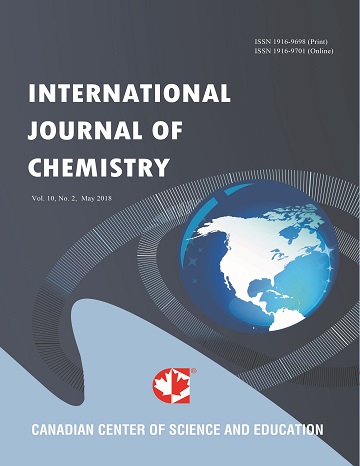Kinetic Study of Hydrolysis of Tri-2,5-diethoxy Aniline Phosphate (An Organo Phosphorus Pesticide) in Acid Medium
- Alka Tangri
- Pradeep Mishra
- Praveen Kumar
Abstract
The present work pertains to synthesis, kinetic behavior and mechanism of hydrolysis of some organophosphoruspesticides. The compound investigated here was 2,5-diethoxyaniline in particular. The corresponding tri-phosphate ester
was prepared in the laboratory by phosphorylation with POCI3. The process involved is that of the substitution of –OH
group of orthophosphoric acid by aryl radical. The kinetics of the hydrolysis of the above ester was studied in acidic
media. The acid employed was HCI. In acidic media, hydrolysis was carried out at three different temperatures 80, 90
and 980C (keeping other parameters of the experiment unchanged). The rate of hydrolysis is found to follow the
Arrhenius equation. The values of the Arrhenius parameters-energy of activation and change of entropy-point to the
bimolecular nature of the hydrolysis of the triester. It can be inferred from the ionic strength data in the range 0.01 to 5
M-HCI, the reactive species of the present triester is conjugate acid species. Effects of temperature, and solvent on the
rate of reaction, together with the correlation of rates with acidity and Bunnett parameters favour bimolecular nature of
hydrolysis. The above results lead to the following most probable route of hydrolysis. In the case of triesers, dioxane
was already present as constituent of the solvent. Experiment was repeated at three different dioxane concentrations in
each case. The analysis of these data led to the interpretation that a transition state is formed with charge dispersed out
of the reactive species and water and that the hydrolysis is a bimolecular nucleophilic reaction. The theoretical part of
the present work includes calculation of the various terms involved in the mathematical formation of Hammett, Zucker
and Hammett, Bunnett and Bunnett and Olsen hypothesis. This part supports the interpretation of the experiment results
regarding the molecularity of the reaction.
- Full Text:
 PDF
PDF
- DOI:10.5539/ijc.v2n1p147
Index
Contact
- Albert JohnEditorial Assistant
- ijc@ccsenet.org
